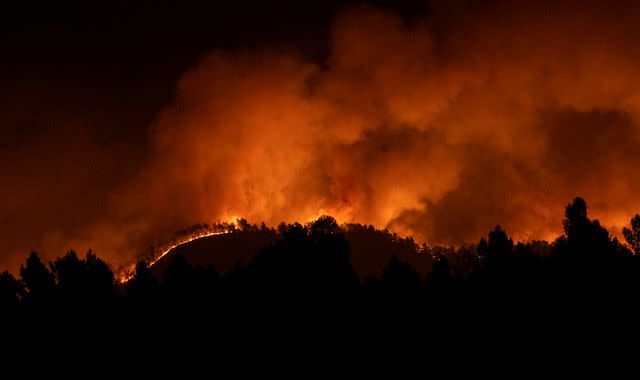Climate change: Why we struggle to process the doom

How do we react to these kinds of statements?
"Humanity is on thin ice and that ice is melting fast."
"The world has suffered greatly from ongoing climate change."
"More poor people die. In every heatwave that we have, thousands of people die."
All said about climate change by people who really know their stuff in response to this week's report from the United Nations Intergovernmental Panel on Climate Change (IPCC).
It is a summary of all the findings on the causes, solutions and effects of climate change revealed by them in the last five years.
Does it make you cut your carbon, scroll on to the next story or hide under the duvet? Let's see what happens when our brains meet climate change.
Sander van der Linden is a professor of Social Psychology at Cambridge University who specialises in our response to news. He believes there is a risk of people being paralysed by fear.
"If you frame things in a way that scares people, it might lead to disengagement and people might tune out because they feel too overwhelmed to want to take action."
But he thinks some concern is useful.
"Worry can be a motivator. If you're sufficiently worried, you'll do your homework and then you try to take corrective action. And I think we want the same thing on climate change," he says.
"We want people to be appropriately worried and motivated to take corrective action, not scared to the point where they're just going to run away and hide."
In that vein, he says effective phrases could be 'experts agree climate change is real, it's us, it's bad, but there's hope' or 'more and more people are changing their behaviour to address climate change'. This signals change within a social group which many of us respond to.
Social signals certainly worked for digital content creator Venetia La Manna. She was already promoting plant-based diets when she was 'called out' and now she champions environmentally friendly clothing.
Read more:
Half a million trees have died next to one 21-mile stretch of road
Proposed 'Hydrogen Village' which could see homes swap gas for hydrogen
Why peat is on the frontline of our battle against climate change
"Someone said, 'great, that you're eating vegetables, but you're wearing fast fashion and that doesn't really align'. And then I went away, watched documentaries, read some books, and here we go," she says.
"So it was, I guess, being held to account online. So that fact that others were sort of scrutinising and saying, 'maybe you should make a change'.
"Often we say, 'oh, you can't shame someone into changing', but I was kind of publicly shamed."
Although reports like the IPCC's are often reported as all doom and gloom, that is not entirely fair. They do stress that, despite being on 'thin ice', we do have a chance.
The document itself includes a graph called 'multiple opportunities for scaling up climate action' showing massive carbon-cutting solutions. Many are cheap, cost-neutral or actually save us money. Unsurprisingly, the media often prefers to simply sound the alarm.
Click to subscribe to ClimateCast wherever you get your podcasts
Friederike Otto is one of the report's authors based at the Grantham Institute for Climate Change and the Environment.
"I think partly it sells better if you have a dramatic story with fear or hysterics. That's a more sexy headline. I think it's really important to highlight that there is a big threat and it's already here. It's not something in the future," she says.
"But we do have the agency to change it and we need to use that agency. I think the headline that is most important would be: 'We have an important job to do to make life better for everyone. But we can do it'."
Getting the psychology of climate change messaging right is not the whole answer: political, economic and whole system changes will be required to meet net zero. But having us engaged, not simply afraid, would help.

 Yahoo News
Yahoo News 
